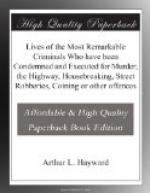He who succeeded him was a footman to the Duchess of Newcastle’s and not being very well acquainted with the nature of his new office, he was very industrious to prevail with Everett to return to his former condition, and accept the key from him. Promises and entreaties were not long made in vain. Everett was sensible there was money to be got,[92] and therefore, upon the fair promises of the new keeper, became turnkey again. But when he had shown his master the art of governing such a territory as his was; when he had instructed him in the secrets of raising money, and shown him the methods of managing the several sorts of prisoners that were committed to its care, his superior quickly gave him to understand that he had now done all he wanted, and the next kind office would be to quit this place; for it is with those sort of people as with some in a higher station, though they at first caress men who are better acquainted with affairs than themselves, in order to improve their own knowledge, yet no sooner do they think themselves qualified to go on without their assistance, but they grow uneasy at such services, and are never quiet until they are rid of men whose abilities are their greatest faults.
A little after Everett was turned out to make room for the keeper’s brother, he had the additional misfortune to keep an account with a person who too hastily demanded his money, and John, not being able to pay it, therefore upon arrested him, and threw him into gaol. He quickly turned himself over to the Fleet, where he first took the rules, and then got into the Thistle and Crown Alehouse, in the Old Bailey. There he lived for a while and afterwards took the Cock in the same place, where he lived for three years with an indifferent reputation, until he was prevailed on to take the Fleet Cellar[93], and became very busy in the execution of the then Warden’s project, until the committee of the House of Commons thought fit to commit both of them to Newgate.
This effectually undid him, for while he was a prisoner there, the brewer made a seizure of his whole stock of beer, to the value of three hundred pounds, and this it was, as he himself said, which posted him out upon the highway again. Whether we may depend upon those protestations he had made that he should never otherwise have gone upon the road again, but have lived and died free, at least from that sort of wickedness which indeed he had reason to dislike, since he had saved his life by impeaching Bird his companion, who was hanged at Chelmsford at the assizes held there for the County of Essex. When he had once taken this resolution in his head, it was not long before he equipped himself with necessaries for his employment.




